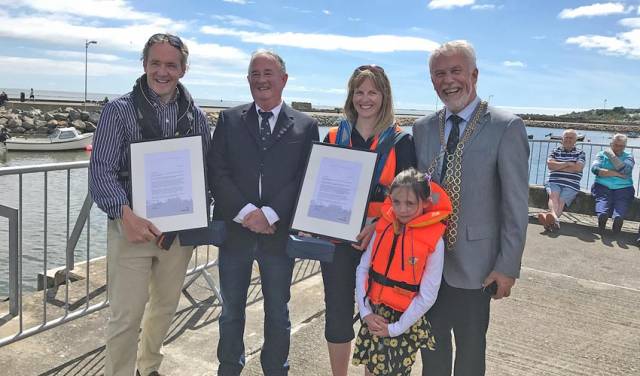#RNLI - Two volunteer lifeboat crew with Wexford RNLI have received the charity’s Excellence in Volunteering Award in recognition for their hard work and dedication to lifesaving.
Lorraine Galvin and David Maguire were presented with their framed certificates during the Wexford Maritime Festival, the hugely popular event the pair helped set up, over the weekend of 1-2 July.
In a citation from the RNLI’s chief executive Paul Boissier, he explained the award was in recognition for David and Lorraine’s “vision in founding the Wexford Maritime Festival back in 2012” and their “drive and energy in continuing to manage and run the festival”.
Boissier went on to praise them for the building of links with other rescue and blue light organisations and for raising awareness of the work of the RNLI.
Welcoming the award, Wexford RNLI lifeboat operations manager Nick Bowie said: “We are very proud of Lorraine and David at the lifeboat station. They take their lifesaving role in the community very seriously and their enthusiasm is infectious.
“Volunteering to be on the lifeboat crew is a huge commitment but to then go on and set up the festival to promote water safety and bring visitors to our town is incredible.”
The Wexford Maritime Event promotes having fun on the water safely and raises funds for the work of the RNLI. It has become one of the largest annual events held in the South East.
RNLI area lifesaving manager Owen Medland commented: “David and Lorraine have demonstrated the very highest level of volunteering both operationally and with their involvement with the Wexford Maritime Festival since its inception. Their energy, enthusiasm and professionalism is contagious.
“Both volunteers are fully deserving of this recognition and we are truly grateful for all they contribute to the saving of lives.”
Declan Geoghegan, SAR operations manager with the Irish Coast Guard, added: “In the many SAR incidents Lorraine and David have been involved in, they have been known for their dedication and dependability in all aspects. They are professional in all aspects of their work.
"The coastguard would like to congratulate Lorraine and David on this well deserved reward.”
































































